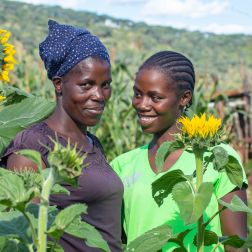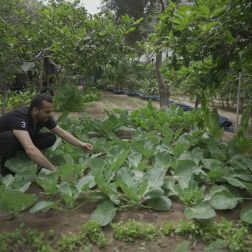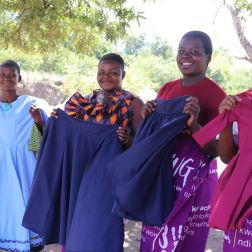- 3 mins read time
- Published: 27th June 2017
Art before ISIS
Little hands wrapped tightly around brushes, a small group of children paint scenes of greenery, homes and villages born from their memories of a time before ISIS.
The excited chatter rises above the sound of pop music playing from a small stereo just outside the door. The children show each other their masterpieces and adult artists who have joined the group mentor and guide them to create their visions on paper.

A young girl from Hassansham camp enjoys Oxfam's painting workshop. Photo:TommyTrenchard/Oxfam
Sura, one of Oxfam’s public health promotion officers, sits with some of the youngest children. She shows them how to hold the paint brushes and urges them on as they slowly draw the shaky outlines of their pictures. It’s the last day of April and the children painting on canvases are in Hassansham camp – home to nearly 10,000 people who have fled the violence in and around the Iraqi city of Mosul.
Today Sura is helping run a fun painting workshop in Oxfam’s community centre in the camp. She is encouraging the children to paint positive scenes of their lives now, or their homes as they remember them, helping them pick bright colours to fill in the crooked lines.
“It’s really important to give the children a chance to have fun and do activities like painting together,” she explains. “Most of them have lived in Mosul under ISIS control for over two years and haven’t had a chance to do anything fun for a long time.”

Sura, Oxfam's Public Health Promotion Officer, helps some of the younger girls paint. Photo: Tommy Trenchard/Oxfam
Around the room, a few adults use easels to paint and sketch more elaborate scenes. Garbi Eunice (51), from Yarmouk, west Mosul, lives in Hassansham and volunteers with Oxfam. His symbolic picture of Mosul shows his home and the local mosque. “I drew a woman to represent Iraq – her hair is the flag,” he says, as he points to a picture pinned to the wall. “Her clothes are the hills and the river and her necklace is a map of the country. Her hands are clutching the rockets and keeping my city safe.”
Garbi’s drawing depicts Mosul and the Kurdistan region. It was important for him to show a united Iraq: “I drew birds to represent peace and I didn’t draw any clouds because they represent war; I want the skies to be clear.”
Sura says that it’s important for people to have a space where they can do positive and creative things, such as painting and drawing. “Now that they have left the bombing and the war they can start to think about nice things again,” she adds as she looks at the children working on their pictures. “These children are having a lovely day being here together having fun and that’s important for their well-being.”

A boy shows a picture he painted of his hometown, Hamdannia, which he remembers fondly. It shows the surrounding river and mountains. His hometown suffered extreme destruction at the hands of ISIS, and most families are yet to return. Photo: Tommy Trenchard/Oxfam
Oxfam started working in Hassansham after the camp opened in October 2016, supplying residents with water, blankets and other essential items. We also set up a casual work scheme as well as a protection programme. In May this year, we handed over most of our projects to a government agency before our staff moved to the Hamam Alil camp to work with new families from west Mosul. The painting workshop was one of a number of activities held by our teams to say goodbye to the camp volunteers and families. Our protection team will continue to work in Hassansham for the next nine months.




